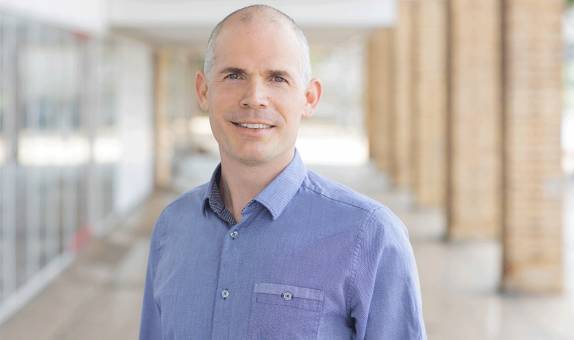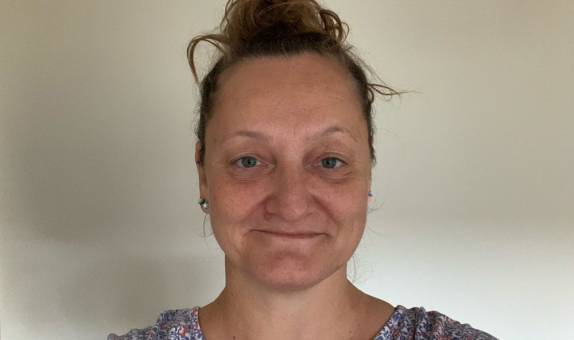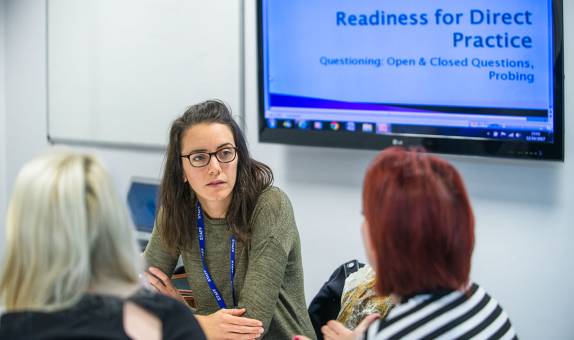Social work (post-qualifying) credit-bearing short course
Why choose this course?
If you are a qualified social worker or healthcare professional, this programme enables you to study individual postgraduate modules on a standalone basis as short courses for continuing professional development (CPD), or gain academic credit towards a postgraduate award or towards continuing professional development (CPD).
This is a flexible approach through which you can develop your skills and knowledge, and gain academic credit towards an Advanced Social Work MA.
All modules include application of learning to professional practice. All modules can be taken as 'free standing' modules.
- Postgraduate Certificate: students must pass 60 Level 7 credits
- Postgraduate Diploma: students must pass 120 Level 7 credits
- MA: students must pass 180 Level 7 credits (including the Capstone Research Project)
| Mode | Duration | Start date |
|---|---|---|
| Part time | Dependent on modules selected | September |
| Part time | Dependent on modules selected | October |
| Part time | Dependent on modules selected | January |
| Part time | Dependent on modules selected | March |
| Main Location | Kingston Hill |
Reasons to choose Kingston University
- These modules incorporate recent changes in social work education and regulation; these include the Chief Social Workers' Knowledge and Skills Statements and responds to the requirements of Social Work England.
- Kingston University has a strong teaching partnership with organisations across South West London and Surrey to ensure you will be kept up-to-date with current practice.
- You can build modules to gain a qualification.
What you will study
You can choose from a variety of modules. There are specialist modules for social workers and allied health professionals, who want to develop their knowledge and skills. Social work practitioners can also build their academic credits towards a Masters in Advanced Social Work. There are also specific modules for practice education.
Modules
List of modules
Best Interest Assessor
30 credits
On the successful completion of this module, you will be awarded the title of BIA which will allow you to practise as a BIA, and undertake assessments to determine if a person is deprived of their liberty and if that deprivation is lawful and appropriate.
Assessment for this module requires you to complete a 3,500-word essay based on a selected practice case study that enables you to demonstrate an applied knowledge of the legislative framework of the codes of practice and case law related to the Mental Capacity Act 2005 and Deprivation of Liberty Safeguards.
Please note: This module is only available for those in the following professional groups, who must have at least two years post-registration experience at the point of commencing the module (Mental Capacity Regulations (2008)). This includes:
a) approved mental health professionals;
b) social workers registered with the Social Work England;
c) first level nurses, registered in Sub-Part 1 of the Nurses' Part of the Register maintained under article 5 of the Nursing and Midwifery Order 2001 (e);
d) occupational therapists registered in Part 6 of the register maintained under article 5 of the Health Professions Order 2001(c); or
e) chartered psychologists who are listed in the British Psychological Society's Register of Chartered Psychologists and who hold a relevant practicing certificate issued by that Society
Safeguarding Across the Life Course
30 credits
This interdisciplinary module aims to address current issues in safeguarding by providing students from different disciplines and agencies opportunities to learn together and develop a better understanding of collaborative approaches to safeguarding those at risk across the life course.
The module will take a holistic safeguarding approach and promote local authorities' national agenda a ‘Think Family' approach, referring to the need for children's, young people's, and adults' practitioners to identify wider family needs which extend beyond the individual they are supporting.
This module is taught over 5 days and will promote joint learning with all students attending days 1 and 2. On days 3 and 4 you will be able to take the option to explore a child- or adult-specific safeguarding topic, then return to the wider group on day 5 to share your learning and present ideas for formative feedback on your assignment plans.
The assignment requires you to submit an essay that demonstrates how you have applied the knowledge gained from this module to a case from your practice. This will enable you to demonstrate your understanding and consider how you can embed the learning gained from this module into future practice.
Individual Work-based Learning Project
30 credits
This module provides an opportunity for students to undertake, under academic supervision, work-based projects and gain credit for this work. The work-based learning approach assumes self-directed and autonomous learning. The module develops the student's own critical reflection skills and to work as a mature self-directed student. Learning outcomes and the method of working will be agreed jointly by the student, module leader / academic supervisor and workplace mentor. The assessment strategy is based upon the principle that work based activities can be used to generate critical reflection and learning outcomes. The assessment submission can take a variety of forms such as reports, essays, discussion documents, and practice analysis.
Coaching and Mentoring in Professional Practice
30 credits
This module aims to equip students to mentor, coach and assess colleagues at post-registration levels. It promotes critical evaluation of theoretical, professional and policy approaches to mentoring, coaching and holistic assessment of professional practice. The knowledge, understanding, values and skills necessary for mentoring and assessing professional practice in social work and related settings are examined. Students are assisted to develop strategies and techniques to enhance their skills in mentoring, coaching and assessment of professional colleagues in different contexts in practice settings. Students are required to mentor, coach and assess colleagues as part of the practicum for this module and provide a report to evidence their critical analysis and appraisal of their developing practice.
Practice Education Stage 1
30 credits
This module equips registered social workers to undertake the responsibilities of a Stage 1 Practice Educator (Practice Educator Professional Standards (PEPS) of the British Association of Social Workers (BASW). Students who complete this module successfully will be able to supervise, teach and assess social work degree students up to, but not including, the final assessment prior to qualification. At this stage, they may contribute to the last placement but not take full responsibility for assessment or act as the practice educator on a day-to-day basis. Students undertaking this module are required to undertake a practicum which entails acting as a Stage 1 practice educator to a degree in social work student on a first placement (70 days).
This module is only available to registered social workers with two or more years' more post-registration practice experience. It is targeted at social worker/experienced social worker level.
Practice Education Stage 2
30 credits
This module equips registered social workers to undertake the responsibilities of a Stage 2 Practice Educator (Practice Educator Professional Standards (PEPS) of the British Association of Social Workers (BASW). Students who complete this module successfully will be able to supervise, teach and assess social work degree students up to and including the last placement and to work with ASYE candidates. In effect, these practice educators will have the authority and capability to recommend, on the basis of appropriate evidence, that the social work students are fit to practise at the point of qualification. The module includes practice assessment.
This module is only available to registered social workers with three years or more post-registration practice experience and who have completed Practice Educator Stage 1 or equivalent. It is targeted at experienced social worker level.
Final Research Project (Capstone) (Advanced Social Work MA only)
60 credits
This module is required for students undertaking studies at masters level and is normally taken after achieving PG Diploma Level. The module will provide students with the experience of utilising principles of research and academic writing and thus demonstrate the intellectual skills learnt on the course. Students are expected to critically review research and to evaluate the evidence underpinning their own practice. The module will provide students with the opportunity to implement the knowledge and skills developed during the previous modules by conducting research focused on a topic of their choice related to their area of practice with the support of a research supervisor. The module will enhance students' presentation and publication skills as the assessment includes writing an abstract, oral presentation and writing an article suitable for publication in a peer reviewed journal.
Entry requirements
Depending on the module, applicants will be need to either qualified social workers or health and social care professionals.
Teaching and assessment
This course offers a flexible professional development pathway to assist qualified social workers in meeting capabilities and standards of practice that are consistent with the role of experienced and advanced practitioners.
It incorporates core elements relating to social work education and professional regulation, such as the Professional Capabilities Framework for Social Work (PCF) and standards for continuing professional development set by Social Work England and the Chief Social Workers' Knowledge and Skills Statements.
Who teaches this course?
Every member of the teaching staff has substantial practice experience in social work. In addition, many are actively involved in social work research, presenting regularly at conferences and publishing in books and journals. In addition, our course teams draw on the wealth of experience provided by our professional contacts and service users and carers who feed into the design of our courses and provide teaching and supervision to enrich your learning.
We have strong links with the NHS, education and healthcare providers and social services, and we also offer classic postgraduate programmes alongside research and continuing professional development (CPD) opportunities.
Fees for this course
Additional costs
Depending on the programme of study, there may be extra costs that are not covered by tuition fees which students will need to consider when planning their studies. Tuition fees cover the cost of your teaching, assessment and operating University facilities such as the library, access to shared IT equipment and other support services. Accommodation and living costs are not included in our fees.
Where a course has additional expenses, we make every effort to highlight them. These may include optional field trips, materials (e.g. art, design, engineering), security checks such as DBS, uniforms, specialist clothing or professional memberships.
Social Work Skills Lab
The skills lab is a purpose-built facility where social work students have the opportunity to learn and to practise key social work skills.
Social workers undertaking continuing professional development courses develop their assessment and intervention skills and other skills such as mentoring, teaching and providing reflective supervision.
What's available?
The skills lab is divided into several sections including:
- a seminar/case conference room for a maximum of 20 people;
- a simulated living-room and front door to assist in developing skills relating to home visits;
- five interview rooms simulating work environments;
- a control room with two-way mirror and viewing monitors; and
- all rooms have fitted cameras and microphones so that activities can be recorded.
A flexible, creative space
The skills lab has been designed to be a multi-functional space which allows flexible use. The furniture is all portable and can be changed according to the simulated activities required.
The small rooms can be used for practising communication skills and simulating supervision sessions.
The large room can be used as a teaching or seminar room and can be set up as a simulated case conference room or duty desk.
Participants have the opportunity to engage in creative skills development activities and benefit from live supervision and feedback from the recorded material.
Where this course will take you
These modules offer a flexible professional development pathway to assist qualified social workers in meeting capabilities and standards of practice that are consistent with the role of experienced and advanced practitioners.
The skills and knowledge gained through these modules will assist practitioners at these levels in undertaking diverse roles such as team leader, workforce development manager, service manager, principal social worker, and other senior leadership and management roles. These modules also offer a route to undertaking further research and scholarship, potentially leading to doctoral studies.
Links with business and industry
We are involved in a unique teaching partnership with seven local authorities and two voluntary sector agencies, including Achieving for Children, Croydon Adult and Children's services, Kingston Adult services, Merton Adult and Children's services, Sutton Adult and Children's services, Richmond & Wandsworth Adult services, Wandsworth Children's services, NSPCC and Welcare, Surrey Children's services, South West London and St George's Mental Health Trust.
Practising social workers are involved in teaching, bringing theory to life with their front-line experiences.
People with lived experience and carers contribute to assessment and quality assurance on our programme.
Course changes and regulations
The information on this page reflects the currently intended course structure and module details. To improve your student experience and the quality of your degree, we may review and change the material information of this course. Course changes explained.
Programme Specifications for the course are published ahead of each academic year.
Regulations governing this course can be found on our website.











